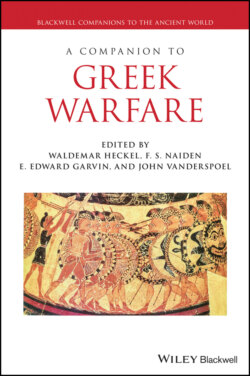Читать книгу A Companion to Greek Warfare - Группа авторов - Страница 42
The Road to Chaeronea (362–338)
ОглавлениеThe indecisive result of the Battle of Mantinea left a power vacuum in Greece, exploited by a new player on the scene, Philip II of Macedon, hailing from a region that was traditionally considered a backwater on the periphery of the Greek world. Upon his sudden accession to the throne in 360/359, Philip energetically began to transform Macedonia into a major power. After centralizing his kingdom and reorganizing the Macedonian army, Philip began to expand, both in the northern Aegean, where the Athenians soon became concerned about maintaining control of their grain supply, and in Thessaly, where he was invited to settle the perennial rivalry between powerful elite families. This Thessalian connection offered Philip an opportunity to intervene in central Greece, in the so-called Third Sacred War (356–346), instigated by the Thebans and the Amphictyonic League that controlled Delphi against the Phocians, who seized the sanctuary and used its resources to hire a mercenary army. A string of victories by the Phocians and their mercenaries resulted in the Thessalian summoning of Philip, who experienced a rare defeat in a first engagement in 353. The following year, however, Philip returned to Thessaly with a larger army and was victorious against the Phocian army in the Battle of the Crocus Field, which established both his control of Thessaly and his reputation as a pious defender of Apollo.44 Nevertheless, the war dragged on for another six years while Philip consolidated his gains in the north, leaving the Athenians little choice but to reluctantly sign a peace with him in 346. The same year, Philip was invited by the Thebans to march south and settle the Sacred War; the Phocians abruptly surrendered (Buckler 2003, 443–452).
The uneasy peace between Philip and Athens did not last long. The orator Demosthenes inflamed emotions in Athens against Philip,45 who responded by laying siege to two of Athens’ allies in the Chersonese and seizing an Athenian grain fleet; the Athenians thereupon renounced the peace.46 When Philip used the outbreak of the Fourth Sacred War to advance to central Greece,47 Demosthenes persuaded the panicked Athenians to forge an alliance with the Thebans.48 The combined armies of the Athenians and the Thebans attempted to bar Philip’s passage south in 338 at Chaeronea in Boeotia. The result was a resounding victory for Philip, whose 18-year-old son Alexander annihilated the Theban Sacred Band (Diod. Sic. 16.85.5–86; Justin 9.3.9–11; Polyaen. 4.2.7). The Battle of Chaeronea left Philip in control of the Greek city-states, ending their long-cherished autonomy.
